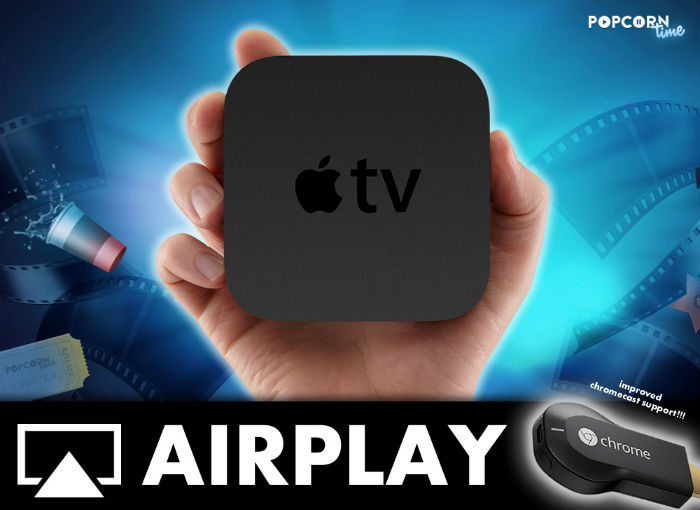TorrentFreak Email Update |
- Popcorn Time Adds Apple TV Support, iOS App Coming Soon
- “Six Strikes” Anti-Piracy Scheme Costs 3 Million Per Year
- Block The Pirate Bay Within 3 Days, Austrian ISPs Told
| Popcorn Time Adds Apple TV Support, iOS App Coming Soon Posted: 30 Jul 2014 02:35 AM PDT
The software became an instant hit by offering BitTorrent-powered streaming in an easy-to-use Netflix-style interface. While the original app was shut down by the developers after a few weeks, the project was quickly picked up by others. This resulted in several popular forks that have gained millions of users in recent months. Today one of the most popular Popcorn Time forks releases a highly anticipated feature. The developers inform TorrentFreak that the latest version now has Airplay support, making it possible to stream movies directly to Apple TVs and other supported devices. Ironically, Airplay support is currently limited to the Windows release, but a Mac version is due early next week and the Linux release will follow shortly after. The latest feature follows the addition of Chromecast support a few weeks ago, but this is by no means the last planned development.  Looking ahead the developers hope to bring the Popcorn Time experience to as many operating systems and devices as possible. “Our ultimate goal is to bring Popcorn Time to every platform, operating system and device that can play videos, so Airplay is one particle of a huge revolution we’re making to the torrents and movies world online,” the time4popcorn.eu team told us. “This is only the beginning… You know us, we have many more surprises coming your way,” they add. One of the “surprises” is a native iOS app. Although it probably won’t be featured in Apple’s App Store anytime soon, Popcorn Time will be available on jailbroken iPhones and iPads in the near future. “Support for iOS devices will be ready in August. It’s already working in our development environment and it’s looking beautiful,” the team notes. Popcorn Time’s popularity hasn’t gone unnoticed by Hollywood. A few weeks ago the MPAA pushed back and managed to get two popular forks removed from Github claiming that the apps are hurting the major movie studios. While this was a setback, it doesn’t seem to have hindered development much. Both Popcorn Time forks are still around and new features are being rolled out faster than ever. Source: TorrentFreak, for the latest info on copyright, file-sharing and anonymous VPN services. |
| “Six Strikes” Anti-Piracy Scheme Costs 3 Million Per Year Posted: 29 Jul 2014 01:09 PM PDT
Through a series of warnings suspected pirates are informed that their connections are being used to share copyrighted material without permission, and told where they can find legal alternatives. These efforts are part of the Copyright Alert System which is headed by the Center for Copyright Information (CCI). The goal of this voluntary partnership is to educate the public and point alleged pirates to legal alternatives. While it’s known that the costs of the program are split between the copyright holders and Internet providers, CCI has been reluctant to share any financial details. Luckily the IRS provides some insight on this front. TorrentFreak obtained the most recent tax filing of the six-strikes outfit which covers the company's operations between July 1, 2012 and June 30, 2013. The document reveals that the program cost nearly $3 million during that period. To put this figure in perspective, the CCI previously reported that 1.3 million notices were sent out during the first 10 months. This means that the cost per notice translates to roughly $2, which is rather high.  Looking at how the money is spent we see that the only paid employee, CCI Executive Director Jill Lesser, received $320,000 in compensation. Another $350,000 went to Lesser’s consulting firm, JAL Consulting, which was hired as an independent contractor. The RIAA’s former lobbying firm Stroz Friedberg received $420,000 for the independent expert analysis of the evidence gathering technology behind the project. After we uncovered the RIAA ties CCI later hired a second independent expert, but the results of this do-over have yet to be published. The largest independent contractor is the Glover Park Group, who handle CCI’s communication. They received more than $680,000 over the reported period. American Arbitration, who handle the appeals of people who claim to be wrongly accused, was paid $245,000 for its services. It’s worth noting that the costs for the Internet providers are higher than the amount they pay to the CCI. The ISPs also spend money on the technical setup that’s required to handle the Copyright Alerts as well as extra customer support. It will be interesting to see how these costs develop over the years. CCI previously announced that more Copyright Alerts would be sent out this year, so it’s expected that the average of $2 per warning will eventually reduce. Whether the copyright holders will ever be able to recoup their investments remains to be seen. Source: TorrentFreak, for the latest info on copyright, file-sharing and anonymous VPN services. |
| Block The Pirate Bay Within 3 Days, Austrian ISPs Told Posted: 29 Jul 2014 06:23 AM PDT
Just a month before Kino.to was dismantled in June 2011, Austrian ISP ‘UPC’ was served with a preliminary injunction ordering it to block subscriber access to the site. Verein für Anti-Piraterie der österreichischen Film und Videobranche (VAP) – the anti-piracy association of the Austrian film and video industry – had been on the warpath since 2010 and had finally got their way after UPC refused to comply voluntarily. But would blocking the site be legal? UPC insisted that it couldn’t be held responsible for a site it had nothing to do with. The ISP also maintained that there had been no court ruling determining that UPC customers who accessed Kino.to were breaking the law. To settle the matter once and for all the Austrian Supreme Court asked the European Court of Justice to clarify whether a company that provides Internet access to people using an illegal website could be required to block that site. On March 27, 2014, the ECJ handed down its decision. On UPC’s first point the Court said that EU law does not require a specific relationship between the person infringing copyright and the intermediary against whom any injunction had been issued. On the second point the Court said that proof of illegality was not necessary as the law exists not only to bring an end to infringement, but also to prevent it. The key point of the ruling was that ISPs can indeed be required to block access to infringing sites provided that injunctions are both balanced and proportional. As a result, earlier this month Austria’s Supreme Court found that the blockade against Kino.to, even though the site is long dead, was correctly applied. On the back of this ruling, this week VAP wrote to several local ISPs, UPC included, demanding a new blockade of three domains – ThePirateBay.se, Movie4K.to and Kinox.to, a site that took over from Kino.to. “Letters dated yesterday have been sent to four large ISPs containing a request to block a small number of websites,” VAP Managing Director Werner Müller told Future Zone. On behalf of three local movie companies (Allegro Film, Wega Film and Epo Film) VAP has requested IP address and DNS blocks of the three sites but has given the ISPs very little time in which to carry them out, by this Friday August 1, to be exact. The Association of Internet Service Providers Austria (ISPA) feels the deadline is far too restrictive. “The period given to the providers to act is ludicrously short. We see this as very problematic. Extreme pressure is being exerted,” Secretary General Maximilian Schubert said. “Two working days during the holiday season is just too little. To implement this by Friday we deem too difficult.” Interestingly, Schubert also sees differences between The Pirate Bay and the pair of streaming portals listed in VAP’s blocking request. “There is also legal content on The Pirate Bay,” Schubert said. Discussions between VAP and the ISPs are scheduled for later in the week, so whether the anti-piracy group will get its way immediately will remain to be seen. They’ve waited years already, another few days shouldn’t make much difference. Source: TorrentFreak, for the latest info on copyright, file-sharing and anonymous VPN services. |
| You are subscribed to email updates from TorrentFreak To stop receiving these emails, you may unsubscribe now. | Email delivery powered by Google |
| Google Inc., 20 West Kinzie, Chicago IL USA 60610 | |


